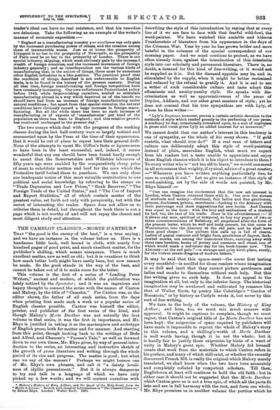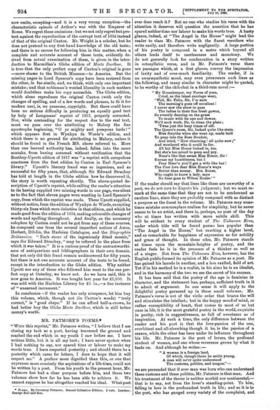THE CAMELOT CLASSICS.—MORTE D'ARTHUR.* THAT " the good is the enemy
of the best," is a true saying ; and we have an instance in the volume before us. Here is a handsome little book, well bound in cloth, with nearly four hundred pages of good print, and much excellent matter, for the publisher's shilling, which means ninepence. There is much excellent matter, new as well as old ; but it is vexatious to think how much better both might have many been, but now cannot be made. So the good stands in the way of the best, and cannot be taken out of it to make room for the latter.
This volume is the first of a series of " Leading Prose Writers," ancient and modern, of which the publication was lately noticed by the Spectator; and it was an ingenious and happy thought to connect the series with the names of Caxton and Malory, by the title of "Camelot." For Caxton was, as the editor shows, the father of all such series, from the days when printing first made such a work as a popular series of
English classics possible. Caxton was himself the editor, printer, and publisher of the first series of the kind, and though Malory's Mirte Darthur was not actually the first volume in that series, it was the first in importance, and Mr. Rhys is justified in taking it as the masterpiece and archetype of English prose, both for matter and for manner. And starting from this point, though looking back to the writings of Bede and Alfred, and Chaucer's "Parson's Tale," as well as forward down to our own times, Mr. Rhys gives, by way of general intro- duction to the series, an interesting and instructive sketch of the growth of prose literature and writing through the whole period of its rise and progress. The matter is good ; but what can we say of the manner ? Perhaps we might borrow one of Mr. Rhys's own phrases, and call it "a dainty loveli- ness of idyllic presentment." But it is always dangerous to try and talk in a language of which we have only picked up a few words ; and we will content ourselves with • Malory's History of King Arthur, and the Quest of the Holy Grail, front the " Horte d'd rthur." &Med, with General Introduction to "The Camelot Claus co," by Ernest Ithys„ London : Walter Scott. 1586„
describing the style of this introduction by saying that at every line of it we are face to face with that fearful wild-fowl, the word-painter. We have watched this amiable and hideous Frankenstein of literature from his appearance in the days of the Crimean War. Year by year he has grown bolder and more hateful in the columns of the special correspondent of our morning paper. And we must continue to protest, as we have often already done, against the introduction of this detestable style into our scholarly and permanent literature. There is, no doubt, a demand for this kind of fine-writing, or it would not be supplied as it is. But the diseased appetite may be, and is, stimulated by the supply, when it might be better restrained and reduced by the refusal to gratify it. And it is sad to see a writer of such considerable culture and taste adopt this effeminate and namby-pamby style. He speaks with dis- crimination as well as appreciativeness of the prose of Dryden, Addison, and our other great masters of style ; yet he does not conceal that his true sympathies are with Lyly, of whom he thus writes :—
" Lyly's Euphues, however, proves a certain artistic devotion to the methods of style which tended greatly to the perfecting of our prose. A. tendency to-day, occasionally remarked upon, to a sort of euphuism in prose and verse gives Lyly an added interest for us moreover."
We cannot doubt that our author's interest in this tendency is one of sympathy, as the whole of his essay shows. "If gold rusteth, what should iron do ?" If a real man of letters and culture can deliberately adopt this style of word-painting instead of plain, masculine English, what must we expect from his readers but a taste unable to appreciate and enjoy those English classics which it is his object to introduce to them? To every writer who is "not too old to learn," we would commend in all seriousness that weighty, if cynical, advice of a great master, —" Whenever you have written anything particularly fine, be sure to scratch it out." Let us give an instance of this style of word-painting, set by the side of words not painted, by Mr. Rhys himself :— "One can imagine the excitement that the new art aroused in London, when Caxton returned there with it. One sees the stream of students and society—dilettanti, fair ladies and fine gentlemen, princes, duchesses, priests, merchants—flocking to the Almonry with their patronage and their suggestions for new books. And Caxton was equal to the hour : with the love and enthusiasm of a student he had, too, the tact of his trade. Here is his advertisement If it please any man, spiritual or temporal, to buy any pages of two or three commemorations of Salisbury, all emprinted after the form of the present letter, which be well and truly correct, let him come to Westminster, into the Almonry at the red pale, and he shall have them good chepe.' The picture this calls up is full of charm. Ladies of quaint costume and bright face, gentlemen of degree, dark- cowled monks, are among the customers there, carrying away with them rare burdens, books of poetry and romance and ritual, one of which would mark a red-letter day for the book-hunter now. 'The Almonry—at the red pale "—a strange and quiet birth-place, surely, for the violent steam-dragons of modern letters."
It may be said that this spoon-meat—the nurse first tasting every mouthful—is needful for those readers whose imagination is so dull and inert that they cannot picture gentlemen and
ladies and monks to themselves without such help. But this fine writing gives no such help. It does not appeal to the imagination at all, but only to the inferior fancy. The historical imagination may be awakened and cultivated by romance like that of Walter Scott, by poetry like Coleridge's "Garden of Boccaccio," or by history as Carlyle wrote it, but never by this sort of fine writing.
We turn to the body of the volume, the History of King Arthur; and here, too, we must mix much censure with approval. It might be captions to complain, though we must regret, that Caxton's original title of Le Morte Dart hur has not been kept : the exigencies of space required by publishers will have made it impossible to reprint the whole of Malory's story in this volume, and a shilling's-worth of Mertes Darihur is well worth having, though it be not the whole; but it is hardly fair to justify those exigencies by hints of a want of unity in Malory's great epic. Whether Malory did himself create that work from the materials to which Caxton refers in his preface, and many of which still exist, or whether the recently discovered French MS. is really the original which Malory merely translated, we shall know when the two have been accurately
and completely collated by competent scholars. Till then, Englishmen at least will continue to hold the old faith : but in either case it should not be suggested that the Mo-te Darthur which Caxton gave us is not a true epic, of which all the parts fit into and are in full harmony with the rest, and form one whole.
Mr. Rhys promises us in another volume the portion which he now omits, excepting—and it is a very wrong exception—the characteristic episode of Arthur's war with the Emperor of Rome. We regret these omissions : but we not only regret but pro- test against the reproduction of the corrupt text of 1634 instead of that of the original Caxton. Mr. Wright is a scholar, but he does not pretend to any first-hand knowledge of the old texts ; and there is no excuse for following him in this matter, when a complete and accurate account of those texts, evidently de- rived from actual examination of them, is given in the intro- duction to Macmillan's Globe edition of 3forte Darthur. It is true that the only perfect copy of Caxton's original is gone —more shame to the British Museum—to America. But the missing pages in Lord Spencer's copy have been restored from the other, in fac-simile, and, we think, with only one important mistake; and that nobleman's wonted liberality in such matters would doubtless make his copy accessible. The Globe edition, which alone reproduces the original Caxton (with only the changes of spelling, and of a few words and phrases, to fit it for modern use), is, we presume, copyright. But there could have been no serious difficulty in producing an equally good text by help of Longmans' reprint of 1817, properly corrected. Nor, while contending for the respect due to the real text, must we pass over the attributing to Malory the fine apostrophe beginning, "0 ye mighty and pompons lords ! " which appears first in Wyakyn de Worde's edition, and which there is no ground for attributing to Malory, unless it should be found in the French MS. above referred to. More than one learned authority has, indeed, fallen into the same mistake, from having assumed without verification that the Southey-Upcott edition of 1817 was "a reprint with scrupulous exactness from the first edition by Caxton in Earl Spencer's library." Upcott's literary fraud was so ingenious, and so successful for fifty years, that, although Sir Edward Strachey has told at length in the Globe edition how he discovered it, the story is worth repeating shortly. The above.quoted de- scription of Upeott's reprint, while calling the reader's attention to its having supplied two missing words in one page, was silent as to the fact that eleven pages were wanting in Lord Spencer's copy, from which the reprint was made. These Upcott supplied, without notice, from the edition of Wynkyn de Worde, excepting thirty-six lines which were defective in that edition, and which he made good from the edition of 1634, making colourable changes of words and spelling throughout. And finally, as the necessary colophon by Caxton could not be got from any of these sources, he composed one from the several imperfect notices of Ames, Herbert, Dibdin, the Harleian Catalogue, and the Biographia Britannica. "Each stone of the ingeniously fitted mosaic," says Sir Edward Strachey, "may be referred to the place from which it was taken." It is a curious proof of the untrustworthi- ness of antiquarians and bibliographers in their own domain, that not only did this fraud remain undiscovered for fifty years, but there is not one accurate account of the texts to be found, except in the introduction to the Globe edition. Why neither Upcott nor any of those who followed him went to the one per- fect copy at Osterley, we know not. As we have said, this is now gone to America. It was bought last year for £1,950. It was sold with the Harleian Library for £5 5s.,—a fine instance of "unearned increment."
In conclusion – if the reader has only ninepence, let him buy this volume, which, though not (in Caxton's words) "truly correct," is "good chepe." If he can afford half-a-crown, he had better buy the Globe 3forte Darthur, which is still better money's worth.

















































 Previous page
Previous page